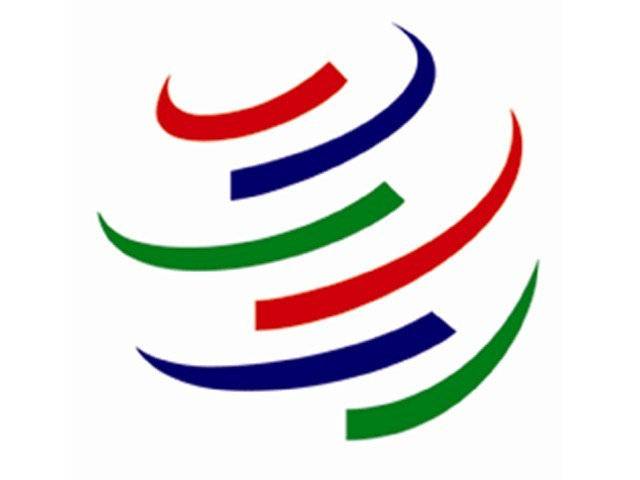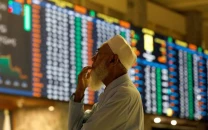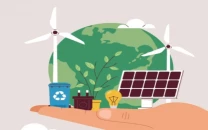WTO’s trade policy review: Praising and criticising Pakistan’s performance
States economy is still vulnerable due to power outages, lack of fiscal space.

World Trade Organisation logo. PHOTO: fb.com/worldtradeorganization
The trade policy review is an important function of the WTO and every member has to undergo a periodic review of its policies and measures including domestic regulations that regulate international trade.
It is part of the mandate given by the WTO members to ensure that measures taken by the members do not contravene the organisations provisions and are not creating hindrance in the smooth functioning of the multilateral trading system. The review is also part of the transparency policies of the WTO that ensures that the multilateral trading system is not impeded by hidden policies and regulations and members get access to all the relevant rules and regulations to facilitate international trade.
Read: WTO strikes 'landmark' deal to cut tariffs on IT products
A permanent Trade Policy Review Board in the WTO conducts the trade policy review and prepares a report for the consideration of the member states. The report prepared by the WTO secretariat is an important document available in the public domain that is widely used by academicians, businesses and governments to judge countries trade and investment potential. The trade policies of the ‘big four’ also known as quad (EU, US, Japan and China) is held after every two years. The next sixteen in terms of share of world trade are reviewed once in four years and the remaining undergo trade policy review every six years. Pakistan’s last trade policy review was held in 2008.
On the macroeconomic front, the WTO in its trade policy review of Pakistan has praised the country for maintaining economic growth in the face of stiff challenges such as security environment, global economic downturn and number of natural disasters that affected it. The WTO maintains that Pakistan’s economy is still vulnerable due to power outages, lack of fiscal space with the government and low investment.
The WTO secretariat is very critical of the efforts of the Pakistan government in generating revenues to improve its fiscal space. The tax-to-GDP ratio in Pakistan is under 10%, which is the lowest in the world. The WTO secretariat in its report blames large number of exemptions, culture of tax evasion and low number of tax payers as main reasons for low tax-to-GDP ratio. The WTO is also highly critical of the sustainability of fiscal policies where it thinks that the growing expenditure cannot be met with such a narrow tax base. The report is of the view that the government is stuck in a vicious circle of borrowing not only for sustaining expenditure but also servicing its debt. The secretariat also mentions the lack of autonomy of the State Bank of Pakistan which has led the governments to continue borrowing to enhance the fiscal deficit.
As regards the import tariffs of Pakistan, the WTO secretariat is of the view that Pakistan’s average tariffs stand at 14.3 percent which are much higher as compared to similar economies. The high tariffs “weaken productivity growth and constitute an impediment to efficient resource allocation and integration of Pakistan into global value chains”. On the transparency in the regulatory environment, the WTO is of the view that the statutory regulatory orders (SROs) which are being used to regulate Pakistan’s international trade by providing relief and exemptions to vested interests is discretionary and highly arbitrary. These “ad hoc policy measures undermine the predictability of the trade regime and support a culture of rent seeking”. The secretariat has, however, praised the efforts of the government of Pakistan in eliminating the exemption SROs by December 2015 which would enhance transparency of the country’s trade policies.
On the issue of trade facilitation, the WTO secretariat has praised the efforts of Pakistan in introducing customs modernisation and reforms which include automating customs clearance through web based customs applications and efforts in developing a national single window. However, the WTO secretariat thinks that Pakistan needs more efforts in modernising its customs administration that would enhance efficiency and transparency. The reforms would also reduce the transactions costs of trade and enhance the competitiveness of Pakistan’s private sector.
The WTO, on the export performance, commented that Pakistan has a very narrow export basket where three categories of products (agriculture, textiles, clothing) are approximately ¾ of Pakistan’s exports. The situation has not improved since the last review of Pakistan in 2008.
Read: Pakistan, India: WTO blames politics for lack of progress in trade talks
The WTO report provides an important document for the policymakers in Pakistan to dispassionately examine its contents that provides a framework for reforming the trade policy regime of the country. The Vision 2025, the Strategic Trade Policy Framework and China-Pakistan Economic Corridor are ambitious initiatives and without addressing fundamental weaknesses as identified in the WTO report it would be difficult for Pakistan to achieve the policy objectives envisaged in these policies.
The writer is a civil servant with 20 years of experience on issues related to Pakistan’s trade and development
Published in The Express Tribune, July 27th, 2015.
Like Business on Facebook, follow @TribuneBiz on Twitter to stay informed and join in the conversation.



















COMMENTS
Comments are moderated and generally will be posted if they are on-topic and not abusive.
For more information, please see our Comments FAQ